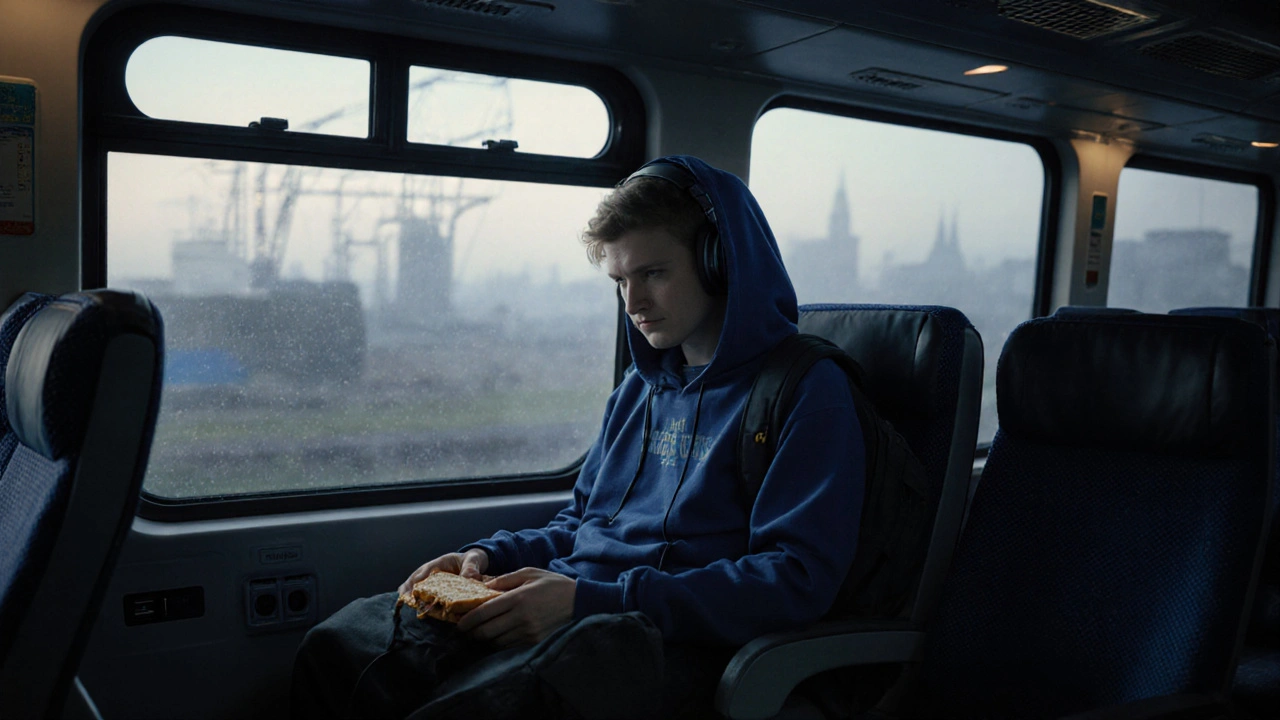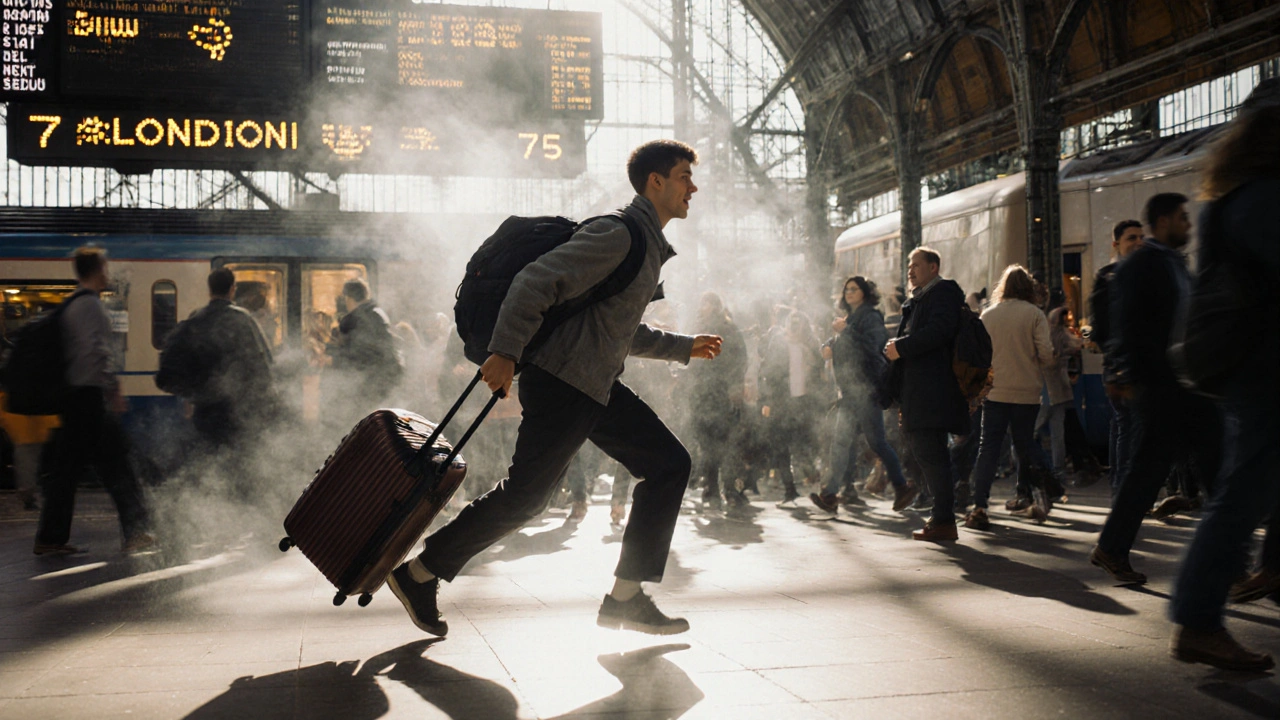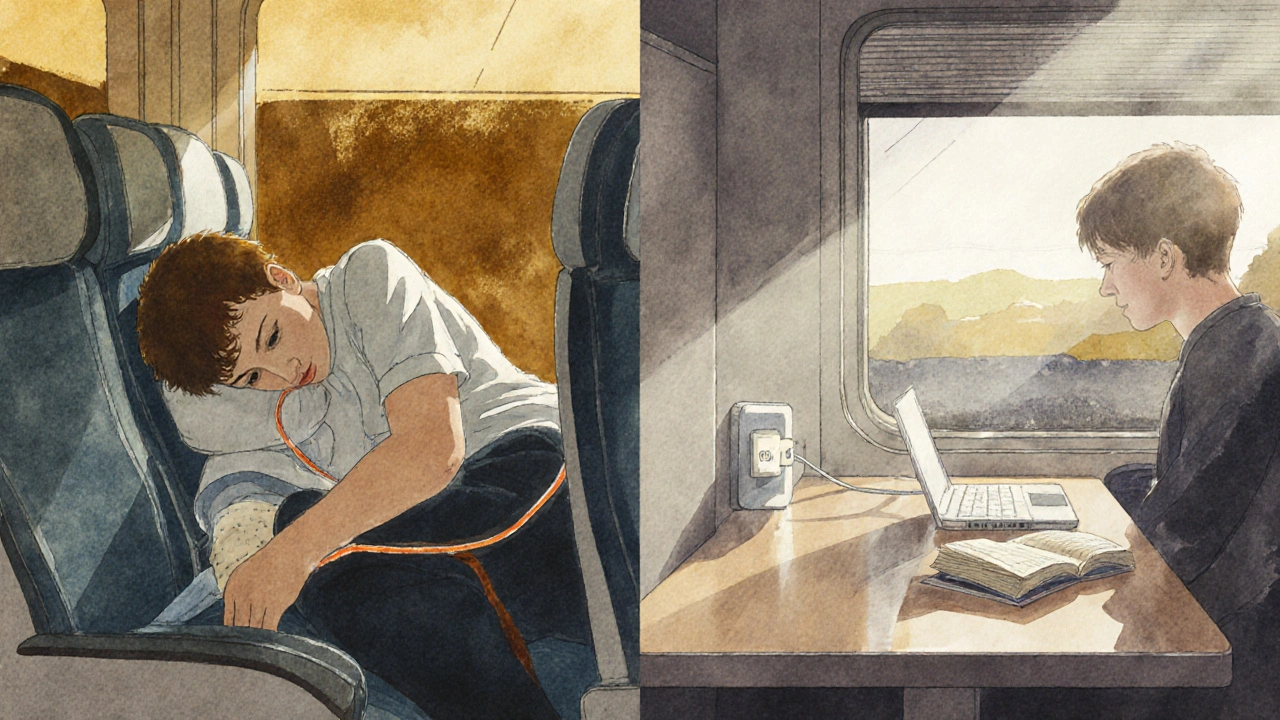
Every UK student who’s ever had to travel home for the holidays knows the dilemma: do you take the coach or the train? It’s not just about getting from A to B - it’s about how much cash you have left after rent, how tired you are after exams, and whether you’ll actually get a seat that doesn’t smell like old chips. The truth? Coach and train aren’t just two ways to travel - they’re two different experiences, with wildly different trade-offs.
Cost: Coach Wins by a Long Shot
If you’re living on a student budget, cost isn’t just a factor - it’s the deciding one. A standard coach ticket from London to Manchester can cost as little as £12 if you book early. Even last-minute fares rarely go above £25. Compare that to a train ticket on the same route, which can easily hit £60-£80 without a railcard, and £40-£55 even with a 16-25 Railcard. That’s more than double.
Coach companies like National Express and Megabus run frequent services and offer student discounts through platforms like UNiDAYS and Student Beans. Some even have £1 fares during off-peak hours - yes, really. You’ll need to plan ahead and be flexible, but if you’re willing to leave at 3 a.m. on a Tuesday, you can save over £50 on a single trip.
Trains, on the other hand, are priced by demand. If you book a week in advance and catch a slow, off-peak service, you might get a decent deal. But if you’re trying to leave on a Friday night before Christmas? Good luck. Prices spike, and you’re paying for convenience, not just the ride.
Time: Train is Faster, But Not Always
On paper, trains win. A direct train from Birmingham to Edinburgh takes about 4 hours. A coach? Around 7.5 hours. That’s a big difference when you’ve got a 9 a.m. lecture the next day and need to sleep.
But here’s what most students don’t think about: travel time isn’t just the time on the road. Train stations are usually in city centers. Coach stations? Often on the outskirts, near industrial estates. Getting from your student flat to the coach station might take 40 minutes by bus. Getting to the train station? Maybe 15 minutes by bike.
Plus, trains run on tighter schedules. If your train is delayed by 20 minutes, you’ll still likely arrive before the coach. But if the coach breaks down - which happens more often than you’d think - you could be stuck for hours. One student in Leeds told me she missed her final exam because her coach broke down near Nottingham. She had to hitchhike the last 30 miles.
Trains are more reliable. They’re less likely to be affected by traffic. And if you’re traveling with heavy luggage - textbooks, a suitcase, a guitar - trains have dedicated luggage racks and space to move around. Coaches? You’re lucky if your bag fits under the seat.
Comfort: It’s Not Just About Seats
Let’s be honest - coach seats aren’t luxurious. They’re narrow, recline only slightly, and the legroom? Forget it if you’re over 5’8”. The heating can be too hot or too cold. And don’t even think about stretching out. One student I spoke to said she fell asleep on a coach from Cardiff to Bristol and woke up with her foot in the aisle because the person in front reclined too far.
Trains, by contrast, have wider seats, more legroom, and actual footrests. Most have power sockets, free Wi-Fi, and quiet zones. You can walk around. Get a coffee. Read a book without bumping your knees into the seat in front. Some long-distance trains even have dining cars.
But here’s the twist: not all trains are equal. A £150 first-class ticket on a Virgin train? That’s a floating lounge. A £30 standard ticket on a crowded 8 a.m. service from Sheffield to London? You’re standing in the aisle for an hour. So comfort depends on how much you spend - and how lucky you are with timing.
Coaches are improving. Newer models from National Express have USB ports, better seats, and even free Wi-Fi. But they still don’t match the basic comfort of a standard train seat. If you’re on a 6-hour journey, the difference matters.

Flexibility and Booking: Coach Gives You More Options
Coaches are more flexible. You can often change your ticket for free up to 24 hours before departure. Train tickets? If you’ve bought a non-flexible fare, you’re stuck. Change it? You’ll pay a £10 fee plus the price difference. That’s £10 you didn’t plan to spend.
Coach companies also let you book one-way tickets without committing to return dates. That’s huge for students who aren’t sure when they’ll head home. Trains require you to pick a specific departure time - and if you miss it, you’re out of luck unless you pay again.
And let’s talk about luggage. Coaches let you check two large bags for free. Trains? You can bring two bags, but you have to carry them yourself. No help. No storage. If you’ve got a 25kg suitcase, a backpack, and a guitar case, you’re going to be tired before you even leave the station.
When to Choose Coach
- You’re on a tight budget and need to save £30-£50 per trip
- You’re traveling during off-peak times (midweek, early morning, late night)
- You’re not in a rush and don’t mind a longer journey
- You’re traveling with lots of luggage
- You’re flexible and can change plans last-minute
When to Choose Train
- You need to get there fast - especially if you’ve got an early class or interview
- You’re traveling with heavy or fragile items
- You want to work, read, or rest during the journey
- You’re traveling during peak times (weekends, holidays, exam season)
- You have a railcard and can lock in a decent price

Real Student Stories
Sarah, 20, from Newcastle, takes the coach every semester. “I saved over £400 last year just by choosing National Express over trains. I sleep through most of the ride, bring a blanket, and listen to podcasts. It’s not glamorous, but it’s real.”
James, 22, in Bristol, always takes the train. “I had a coach break down during my final exams. I missed my revision time. I’ll never risk it again. Even if it costs more, I need to know I’ll get there on time.”
Emma, 19, from Cardiff, does both. “I take the coach home for Christmas because I’ve got a few weeks off. But for my internship in London? Train. I need to be alert, and I need to get there before 9 a.m.”
Pro Tips for Student Travel
- Book coach tickets at least 2 weeks in advance for the best deals
- Use the 16-25 Railcard for trains - it cuts fares by a third
- Download apps like National Express, Trainline, and Megabus for real-time updates
- Bring snacks, a neck pillow, and earplugs - no matter which you choose
- Check for student discounts on both services - many offer exclusive codes
- If you’re traveling with friends, split a coach ticket and take turns sleeping
Final Verdict
There’s no single right answer. Coach is the smart choice if you’re saving every pound. Train is the smart choice if your time, sanity, and peace of mind matter more than cash.
Most students I’ve talked to use both - coach for long breaks, train for urgent trips. The key isn’t picking one forever. It’s knowing when each one makes sense.
Next time you’re planning your trip home, ask yourself: Do I need to get there fast? Or do I need to keep my budget intact? Answer that, and the choice becomes obvious.
Is coach travel safe for students in the UK?
Yes, coach travel is safe. Companies like National Express and Megabus have strict safety standards, CCTV on board, and trained drivers. Most coaches run on major routes with frequent service. As long as you keep your belongings close and avoid traveling alone late at night if you’re uncomfortable, it’s as safe as any other form of public transport.
Can I use my 16-25 Railcard on coaches?
No, the 16-25 Railcard only works on trains. But many coach companies offer their own student discounts through UNiDAYS or Student Beans. You can’t combine the Railcard with coach fares, but you can still save 10-20% with student codes.
Are there any hidden costs with coach travel?
Most coach fares are all-inclusive - no extra fees for luggage or booking. But some companies charge extra for seat selection, priority boarding, or changing your ticket at the last minute. Always read the fine print before booking. Also, if you’re traveling with oversized items like a surfboard or large musical instrument, you might need to pay extra or book in advance.
Do trains have Wi-Fi and power outlets?
Yes, nearly all long-distance and intercity trains in the UK have free Wi-Fi and power sockets at every seat. Some regional services might not, but if you’re traveling between major cities, you can count on both. Coaches are catching up - newer models have USB ports, but not always full power sockets.
What’s the best time to book for the cheapest fares?
For coaches, book 2-4 weeks in advance for the lowest prices - especially for weekends and holidays. For trains, the cheapest fares are usually available 12 weeks ahead, but only if you pick off-peak times (weekdays before 9 a.m. and after 4 p.m.). Avoid Friday evenings and Sunday nights - prices spike.
Can I take food and drinks on coaches and trains?
Yes, both allow food and drinks. Coaches don’t have dining cars, so bringing your own snacks is smart. Trains have cafes, but prices are high - a sandwich can cost £6. Bring your own meals and save money. Just avoid strong-smelling food on coaches - others might not appreciate it.